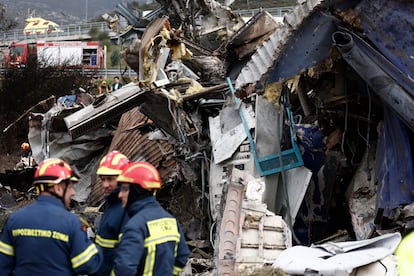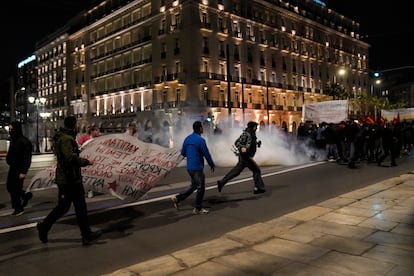Greek train crash survivor: ‘To the right everything was fire, smoke and screams. To the left there was only darkness’
Protests have taken place in Athens and Thessaloniki blaming the accident on the poor state of the railway system

The railway route that connects Athens and Thessaloniki, the two main cities of Greece, is always a busy line. Both cities are home to practically half the entire population of the country. Monday, February 27, had been the last day of Carnival, one of the most important festivals in the Orthodox calendar. It is a public holiday and tradition says that you have to fly a kite and eat fish to mark the beginning of Lent. Most of the passengers on the train that crashed on Wednesday, killing at least 43 people in the biggest railway tragedy in Greece’s history, were students who were returning to school after spending the holiday with their families.
Alexandra Riba is a young photographer who was traveling in carriage number six. “I was listening to music,” she recalls, speaking from Thessaloniki. “Everything was going fine and then I felt a very sudden stop and a deafening noise. At one point the sound stopped suddenly and we all looked at each other for a few seconds, trying to figure out what had happened.” Although she was lucky compared to the passengers in the front cars, Alexandra experienced moments of terror. “I didn’t understand what was happening. It was very, very scary because it was dark,” she says. A passenger in her car had a panic attack and was screaming that he was afraid they would get hit by another train in the dark, because they had to walk for a long time on the tracks.
“I remember people yelling ‘help’ and screaming from within the smoke,” she recalls. There was only one injured person in her car, a woman with blood on her head whom they tried to help. “Once you got off the train, to the right everything was fire, smoke and screams. To the left there was only darkness and railway tracks,” says Riba.
When they managed to get out of the train they ran into a precipice, and from there they could not see a way to get to the road to seek help. Finally, they managed to reach the highway in small groups, and the police helped them onto a bus that took them to Thessaloniki, where they arrived at around 3am.

Another young passenger named Yorgos recalls how he had to break the window with his luggage to get out of the train. “Two cars were on fire and one had turned over. I was in car number four,” he recalls, still shaken. Yorgos saw fire and sparks through the window moments before the accident. “Suddenly we stopped. We broke the window with my backpack. There were some people near the windows, we broke two of them and got out. Then we saw the chaos, I can’t describe it.”
In Tempi, the police warned reporters that what they were going to see was shocking. “Firefighters, who are accustomed to everything, have told us that they have witnessed terrible scenes,” one of the officers told the assembled journalists. He was referring to the charred bodies visible among the wreckage of the first cars.
Kostas, another young man from Thessaloniki, had gone to the station to wait for his girlfriend. At first he thought it was a regular delay. He waited for four hours, well into the night. When he saw more and more people arriving at the station, he thought that perhaps the train had broken down. He realized that something more serious was happening when he saw reporters showing up. But there was no one from Hellenic Train, the company that provides the railway service, to inform them. Kostas says that people at the station found out about the accident from the taxi drivers, who had heard it on the radio. As he watched buses arrive with evacuated passengers, Kostas grew increasingly concerned, but did not lose hope that his girlfriend would be on the next one. The last time EL PAÍS was in touch with him, around 4am, he had not yet received any news from his partner.
In the morning, a father showed reporters a photograph of his daughter, a brown-haired twentysomething dressed in a patterned skirt. “All we want is, if someone knows anything about her, to please let us know,” he repeated a couple of times. Although the number of dead and injured has been updated several times, the government of Kyriakos Mitsotakis has not yet provided a figure for missing people. The process of identifying the bodies has begun, but it will take days or weeks.
On Wednesday night, a demonstration commemorating the victims of the accident swept through the streets of Thessaloniki. Young people carried flowers and banners blaming the incident on the poor state of the railway system and chanting slogans against the privatization of public services. The youths drew the word “criminals” with candles in front of the Macedonia-Thracian vice-ministerial headquarters.
Sign up for our weekly newsletter to get more English-language news coverage from EL PAÍS USA Edition
Tu suscripción se está usando en otro dispositivo
¿Quieres añadir otro usuario a tu suscripción?
Si continúas leyendo en este dispositivo, no se podrá leer en el otro.
FlechaTu suscripción se está usando en otro dispositivo y solo puedes acceder a EL PAÍS desde un dispositivo a la vez.
Si quieres compartir tu cuenta, cambia tu suscripción a la modalidad Premium, así podrás añadir otro usuario. Cada uno accederá con su propia cuenta de email, lo que os permitirá personalizar vuestra experiencia en EL PAÍS.
¿Tienes una suscripción de empresa? Accede aquí para contratar más cuentas.
En el caso de no saber quién está usando tu cuenta, te recomendamos cambiar tu contraseña aquí.
Si decides continuar compartiendo tu cuenta, este mensaje se mostrará en tu dispositivo y en el de la otra persona que está usando tu cuenta de forma indefinida, afectando a tu experiencia de lectura. Puedes consultar aquí los términos y condiciones de la suscripción digital.








































